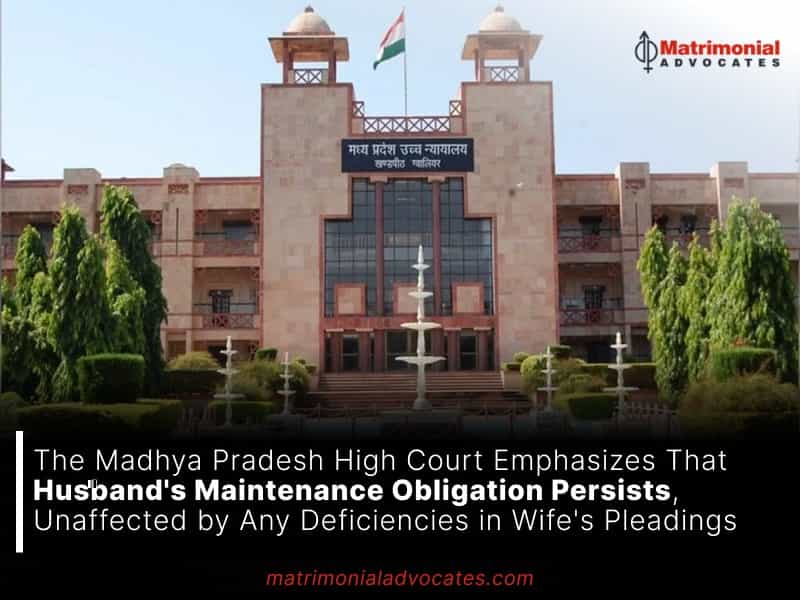
In its dismissal of a criminal revision application brought forth by the petitioner-husband, the Madhya Pradesh High Court has emphatically underscored that the maintenance claims of a financially dependent wife should not be prejudiced solely on account of deficiencies within her pleadings. The petitioner-husband had contested a Family Court’s decision that rejected his plea, pursuant to Section 127 of the Criminal Procedure Code (CrPC), to decrease the quantum of maintenance payments.
Justice Prem Narayan Singh, presiding as a sole judge, invoked the precedent set by the Supreme Court in the case of Sunita Kachwaha & Ors. v. Anil Kachwaha (2015) and articulated the principle that an overly meticulous or hyper-technical approach should not govern proceedings in maintenance cases.
“…the destitute wife who is unable to maintain herself cannot be victimised only on the basis of her fault. The hyper technical attitude cannot be adopted in such type of maintenance cases. As such the petitioner cannot escape the liability of maintenance of the child and wife on excuse that she has done some fault in her pleadings and proceedings of the case…”, the court noted in the order.
In the precedent of Sunita Kachwaha & Ors, the apex court pronounced a crucial determination that proceedings under Section 125 of the Criminal Procedure Code (CrPC) are intrinsically summary in nature. These proceedings are not intended to undertake a detailed analysis of the complexities inherent in marital disputes. The apex court expressly underscored that in an application under Section 125 of the CrPC, ascertaining fault and its extent remains inconsequential.
Conversely, in the present case, the Family Court had previously declined a petition under Section 127 of the CrPC, invoking the legal precedent of Chaturbuj v. Sitabai from 2008. The Family Court opined that even if the wife were to garner some income following the marital separation, such an occurrence would not constitute a valid rationale for withholding maintenance.
Nonetheless, the husband contended that the wife is presently employed as a teacher, drawing a substantial salary, and further claimed that the wife had purposefully withheld details regarding her earnings in her pleadings.
In Chaturbhaj, the Supreme Court has clearly stated that ‘the phrase “unable to maintain herself… would mean that means available to the deserted wife while she was living with her husband and would not take within itself the efforts made by the wife after desertion to survive somehow…”.
Justice Prem Narayan Singh duly acknowledged that, during the wife’s initial examination, she explicitly affirmed her lack of income at that time, citing her non-employment as the reason. Importantly, these statements remained uncontroverted during the subsequent cross-examination. The court further underscored that the possession of an MPhil degree by the respondent-wife did not preclude her from pursuing maintenance from her husband.
Notwithstanding the petitioner’s contention that he voluntarily terminated his engineering employment and, consequently, should be exempt from the obligation to provide maintenance to his wife, who was employed at Bhartiya Mahavidyalaya, Ujjain, the High Court arrived at a contrary determination. This decision was grounded in the legal precedent established in Shamima Farooqui v. Shahid Khan (2015), where the apex court decreed that a husband’s voluntary retirement with the intent of evading maintenance responsibilities cannot be sanctioned.
“As per the aforesaid law, it is manifestly clear that even if the petitioner has left the job, he will be liable to maintain his wife and child”, Justice Prem Narayan Singh clarified.
The court referenced a past legal precedent from the Delhi High Court, which held that a physically capable young man is presumed to have the ability to earn enough income to support his wife and child.
Regarding the request to send the case back to the family court, the High Court found it inappropriate at this stage of the legal proceedings. Both parties have been in litigation since 2016, but they have the right to approach the trial court if there are significant changes in circumstances, as allowed by Section 127 of the Criminal Procedure Code (CrPC).
The husband initiated the current petition under Section 19(4) of the Family Court Act, along with Sections 397/401 of the Code of Criminal Procedure (Cr.P.C.), to request the High Court’s review.
Advocate Pankaj Soni represented the petitioner, while Advocate Shanno Shagufta Khan represented the respondent.
Background:
In a previous development in 2020, the Family Court rejected the husband’s request for a reduction in the maintenance payments to his wife and their son. The maintenance amounts were set at Rs 7,000 for the wife and Rs 3,000 for the son. This decision followed the couple’s separation after their 2014 marriage, leading to the maintenance order in 2018, based on a request filed under Section 125 of the Criminal Procedure Code (CrPC).





